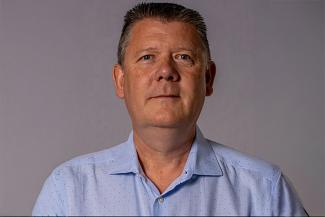Stephen Hill

Contact Information
Stephen Hill received his BA and D. Phil. degrees from the University of Oxford in 1991 and 1994, respectively. From 1995 to 1997, he held postdoctoral positions at Boston University and the FSU National High Magnetic Field Laboratory (NHMFL), then took up faculty positions at Montana State University (1997 - 2001) and the University of Florida (2001 - 2008) before moving back to FSU in 2008.
In addition to serving as a member of the FSU physics teaching faculty, Prof. Hill serves as Director of the Electron Magnetic Resonance (EMR) user program at the NHMFL. This is one of the most interdisciplinary programs at the lab, with affiliated faculty in physics, chemistry and biology departments at two campuses in Florida (FSU and the University of Florida). The EMR group in Tallahassee supports six full time staff, as well as several postdocs and as many as 10 affiliated graduate students.
Prof. Hill has 30 years of experience performing microwave and far-infrared magneto-optical spectroscopy in high magnetic fields, spanning the range from 0.3 to 200 wavenumbers (9 GHz to 6 THz), using a wide array of compact radiation sources (gas lasers, vacuum-tube oscillators and solid-state devices) and measurement techniques [cyclotron resonance, optical conductivity and electron paramagnetic resonance (EPR)]. Through this work, he has gained an international reputation in the spectroscopy of low-dimensional conducting, superconducting and magnetic systems in high magnetic fields, including significant technique development. The EPR group that he directs also has an extremely strong track record in terms of instrument development, having assembled the world’s highest field/frequency instruments for both continuous-wave and pulsed EPR measurements. Hill’s research has focused on fundamental studies of quantum phenomena in molecular magnets and correlated electron systems (quantum magnets and superconductors), as well as structure property relationships in a wide variety of polynuclear transition metal complexes. Current research in the group is funded by multiple grants from the Department of Energy and the National Science foundation, with a primary focus on development of next-generation molecular quantum technologies.
Prof. Hill received a Cottrell Scholars Award from Research Corporation in 2000, and a National Science Foundation CAREER award in 2003. In 2014, he was elected Fellow of the American Physical Society and received the International EPR Society Silver Medal for Instrumentation. He also received the FSU physics departmental PAI Award for Excellence in Teaching and Research in 2015 and earned the title of FSU Distinguished Research Professor in 2022. Hill was most recently selected to serve on the National Academies of Sciences Engineering and Medicine Committee on Identifying Opportunities at the Interface of Chemistry and Quantum Information Science
